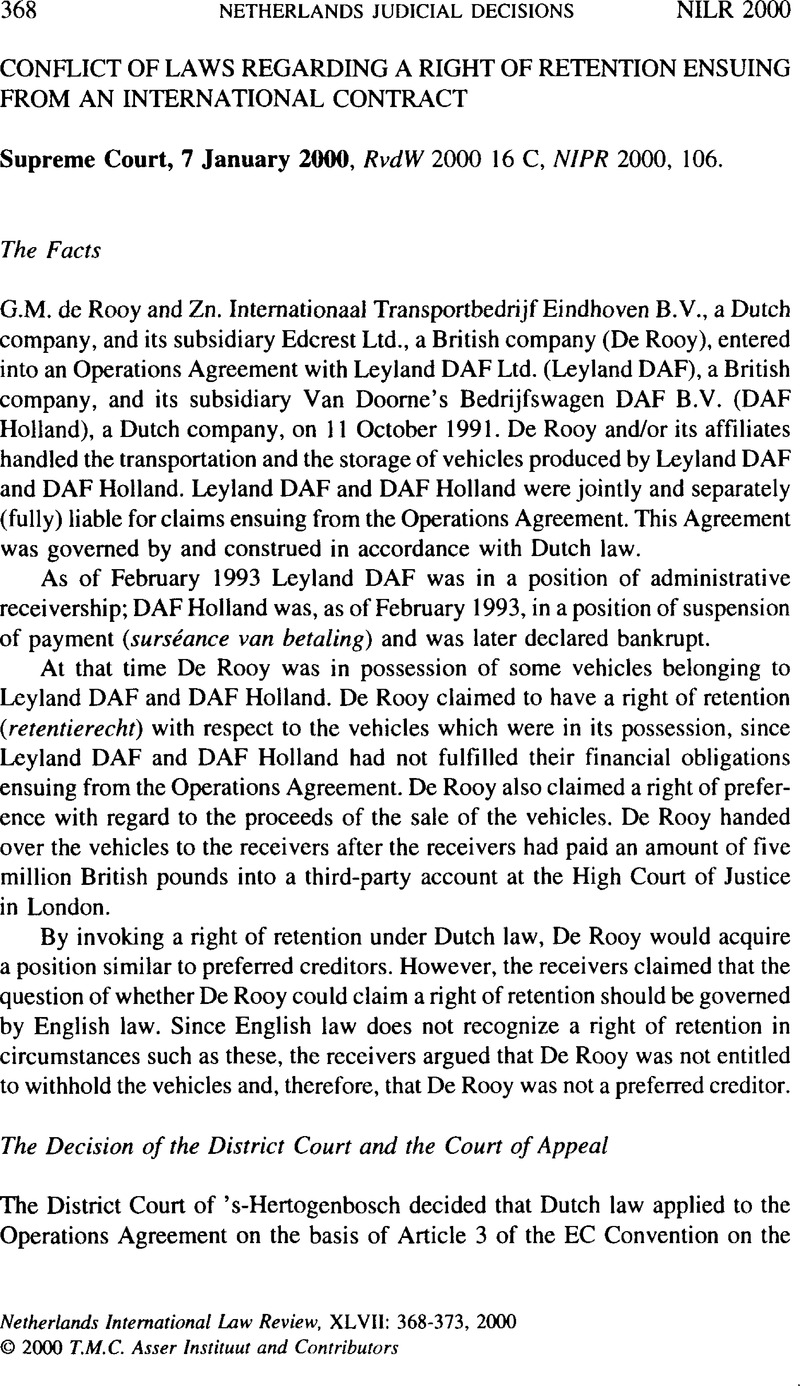No CrossRef data available.
Article contents
Supreme Court, 7 January 2000
Published online by Cambridge University Press: 21 May 2009
Abstract

- Type
- Netherlands Judicial Decisions Involving Questions of Private International Law
- Information
- Copyright
- Copyright © T.M.C. Asser Press 2000
References
1. The Supreme Court also mentioned Art. 6 of the Law containing rules of private international law regarding sea law, inland navigation law and air law, which contains a specific conflicts rule with regard to the right of retention of vessels and airplanes.
2. The Report can be found at http://www.minjust.nl/c_actual/rapport/privaat.htm.
3. See also the decision of the Supreme Court of 3 September 1999, RvdW 1999, 114 C, 47 NILR (2000) p. 217 note Jacobien W. Rutgers, in which the Supreme Court stated that the question of whether delivery of goods has taken place must be answered according to the lex rei sitae of the country where the goods were situated at the time of delivery.
4. For a comparison of the right to withhold performance, see the comments to Art. 9:201 of the Principles of European Contract Law in: Lando, O. and Beale, H., eds., Principles of European Contract Law (The Hague, Kluwer Law International 2000) pp. 406 and 407.Google Scholar For the right of retention in insolvency, see Veder, P.M., ‘Operation of Security Rights in the Context of International Insolvency’, in Hondius, E.H., ed., Dutch Reports to the Fifteenth International Congress of Comparative law, Bristol 1998 (Antwerp-Groningen, Intersentia 1998) pp. 191 et seq.Google Scholar
5. See the overview of Dutch case law by Vlas, P. and van der Weide, J.A., Weekblad voor Privaatrecht, Notariaat en Registratie (1995) 6205.Google Scholar
6. In his concluding remarks before the decision of the Supreme Court Advocate General Strikwerda mentioned that as far as Germany, Switzerland, Austria and to a lesser extent, France and Belgium are concerned, the right of retention (or its equivalent) has property-law aspects, the applicable conflict-of-law rules are those regarding security rights and property law.
7. However, according to the Supreme Court's decision, it is not clear how the lex contractus should be determined. The Supreme Court explicitly holds that a right of retention falls outside the scope of the Convention and that the rules of private international law should be derived from the common rules of Dutch private international law regarding security rights. Since those rules (partly) focus on the lex contractus, the question may arise whether this automatically leads to the conclusion that the Convention should determine the law which applies to the ‘contractual part’ of the right of retention. This is preferable from a ‘pragmatic point of view’. However, from a ‘technical point of view’ this may raise some questions. Advocat e General Strikwerda considered whether the right of retention should fall outside the scope of the Convention and concluded that it should. This is important because, if the right of retention would fall within the scope of the Convention, this would lead to the conclusion that the (national) Dutch rules of private international law, as a result of Art. 94 of the Dutch Constitutional Act, would not be applicable. The Convention would then overrule the rules of national law. For that reason it may be argued that the rules of the right of retention which relate to the ‘contractual part’ may not be ‘taken back’ into the Convention since it is established that the right of retention falls outside its scope.
8. See Verhagen, H.L.E., 5 Jurisprudent Onderneming en Recht (2000) no. 46, p. 231.Google Scholar
9. See Bertrams, R.I.V.F., ‘Het Europees insolventieverdrag’, 2 Tijdschrift voor Insolventierecht (1996) pp. 61 et seq.Google Scholar
10. Report of the Standing Government Committee, Art. 3. See also Rutgers, J.W., ‘Eigendoms voorbehoud en de Staatscommissie IPR’, 16 Nederlands Tijdschrift voor Burgerlijk Recht (1999) pp. 324 et seq.Google Scholar




